The historical Classical Liberal debate between consent vs. coercion, or within the sphere of consent itself, came down to Delegation vs. Alienation, and coercion was seen as neither delegation nor alienation for reason.
| Coercion | Consent | Consent |
| Alienation (translatio) | Delegation (concessio) |
The table above maps to the blue model of institutions on the left, whereas Ellerman proposes the model on the right as the correct framing (Ellerman’s originals (also see)):
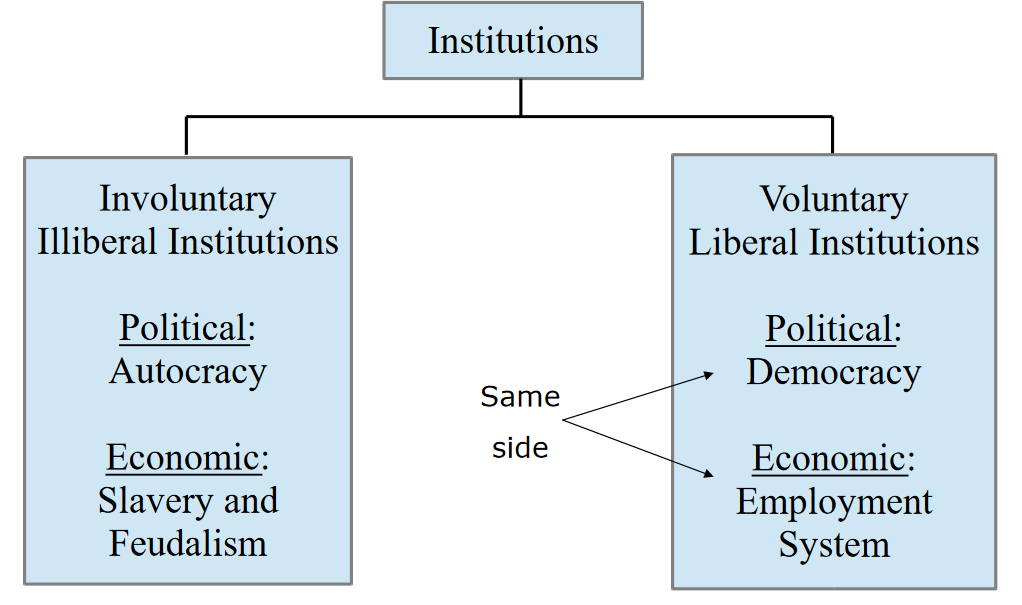
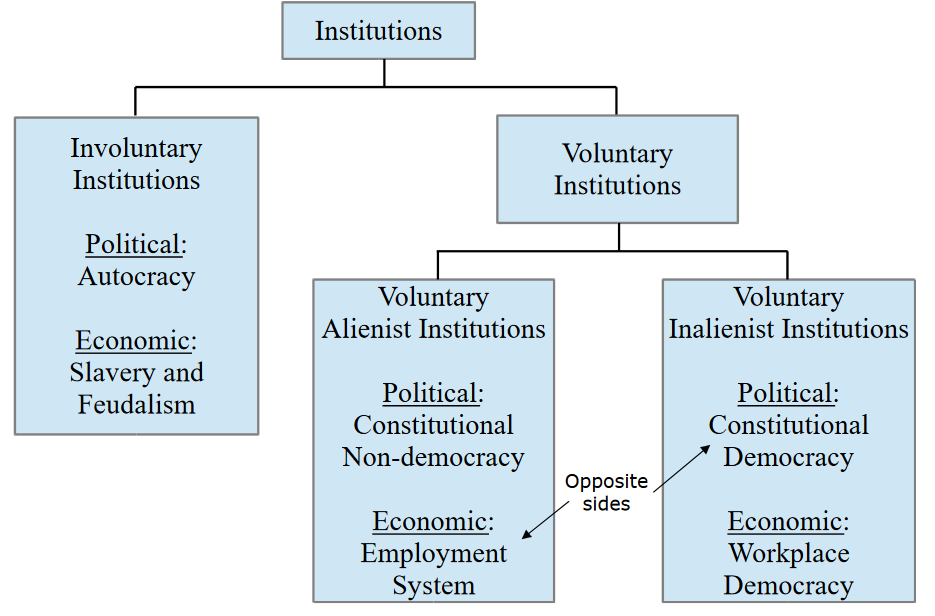
Long’s different, but related original:
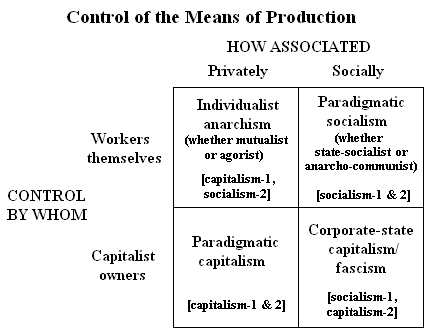
David Ellerman, and Roderick T. Long have produced a plethora of good writing and thinking, including the items above, but I tweaked, merged, and expanded their graphics and ideas, including those of Gary Chartier and Charles Johnson:
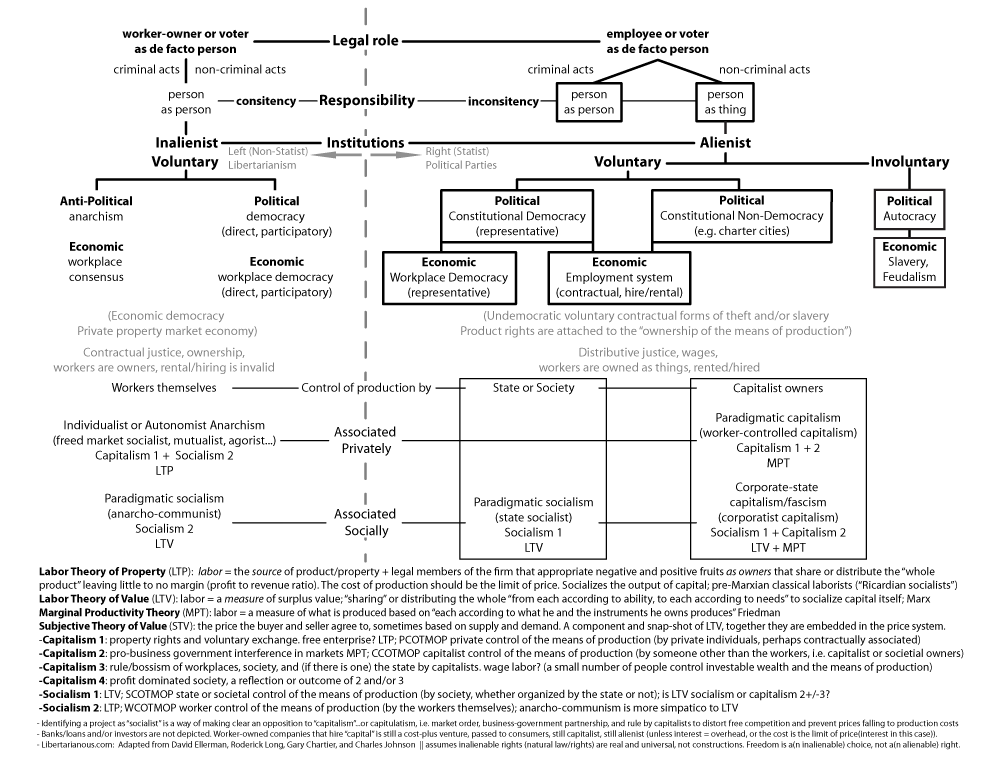
The Classical Liberal framing falls short as Ellerman noted, but even Ellerman seems to not go far enough. Below is a remix considering Hohfeld:
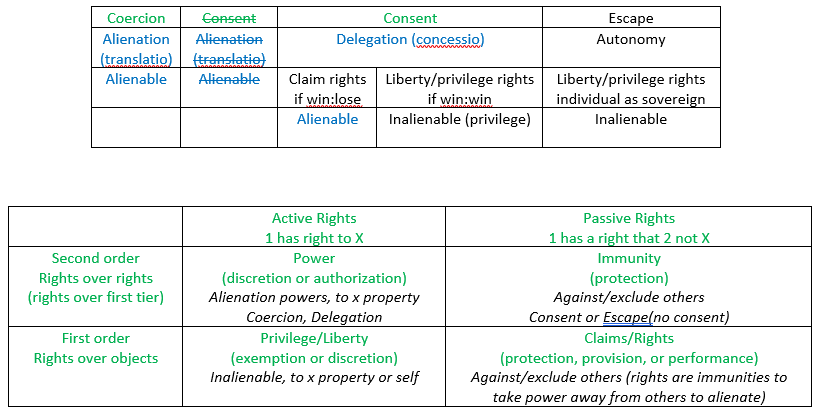
Passive rights are negative/immunity or positive/claim rights. Privileges and powers are not negative rights. Privileges, powers, and immunities are not positive rights.
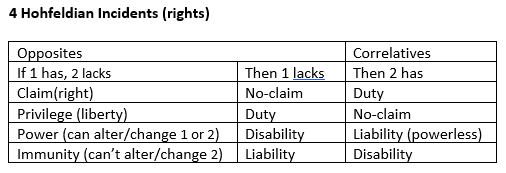
Fundamental Legal Conceptions, As Applied in Judicial Reasoning and Other Legal Essays; Yale Law Journal, 23(1):16–59, Nov. 1913. Wesley Newcomb Hohfeld
- “A right is one’s affirmative claim against another” [p55] (responsibilities, duties, obligations)
- “privilege is one’s freedom from the right or claim of another” [p55] [negative right or immunity?]
- “power is one’s affirmative ‘control’ over a given legal relation as against another” [p55]
- “immunity is one’s freedom from the legal power or ‘control’ of another as regards some legal relation” [p55]
- “A duty or a legal obligation is that which one ought or ought not to do. ‘Duty’ and ‘right’ are correlative terms. When a right is invaded, a duty is violated… a duty having a content or tenor precisely opposite to that of the privilege in question.” [p32]
- Full privilege/liberty rights, and no claim rights, would mean everything was permitted
- Full claim rights, and no privilege/liberty rights, would mean everything was prohibited or compulsory
- A claim right to privilege/liberty means people are indebted to respect others’ privilege/liberty
- Privileges and powers are not negative rights (entitled to non-interference)
- Privileges, powers, and immunities are not positive rights (entitled to provision of good/service, via duty of others)
- Negative rights are respected by refraining from interfering with others
- Fulfilling everyone’s positive rights may be difficult or impossible. This Mutual Exchange Radio Podcast with William Gillis on Positive and Negative Liberty is worth a listen. The basic premise of Gillis is that Positive Liberty is the cornerstone to a larger praxis that includes rights talk.
- rights in rem: real rights: negative/against the world at large to be left alone, proprietary (Hohfeld used “multital”)
- rights in personam: personal rights: positive, contracts (Hohfeld used “paucital”- right duty limited circumstance and people); privileges, some immunities
- jus ad rem: right/s transfer

What is, or rather ought, to be permitted, required, or forbidden? Who decides the is vs. ought is a freedom vs. license/permission/rights question. “Rights are an ought border; liberty is a borderless is.” EMN
Natural law proponents must answer why laws, if natural and universal, are often a dilemma of self-interest vs. the interest of others, including that of the rule makers?
Why focus on “rights talk” as it shifts the focus to right holders, not those stuck with the obligations or oughts/responsibilities? As Marx pointed out, the rights holder is an “isolated monad…withdrawn behind his private interests and whims and separated from the community.” (Marx 1844, 146) Sad as it is, we have a system where rights are needed unless simplified to “stay out of my business” (and by default the business of others), but we are often in other’s business as we are not me, or me’s must interact unless totally cut off from we, or society for that matter.
Regretfully, most of the freedoms we have were fought for, not handed to us, because the State is not much different than feudalism and bureaucratic nobility protecting their interests. Rights can create confrontations by inhibiting dialogue or negotiation because rights can become a trump card (or series of trump cards) to stop discussion that might lead to consensus, accommodation, common ground, and liberty for that matter. The communitarian view is that rights should not be trump cards, but cards for playing and building with other selves and recognizing that other selves have needs and rights claims that vary in cultural contexts. This isn’t to stay communitarianism is the answer, but it’s not as though most people can’t agree with this view. We are stuck with politics in the end, which seems to be a system of rigging trump cards to favor the ruling class.
Is anarchism’s anti-politics and the “chaos” of many paths, with one vision that accepts there are many paths, an answer? Or if you like, is contingency (in the sense of Richard Rorty) agency, in other words, is the power to action based on the truths we hold/think be true? How can you answer no, how can you deny anarchism?
Paths, or paths to resources (or more than one vision), can sometimes lead to conflict or rivalry as there is no coordination/cooperation. (elaboration and game theory problems to be discussed in a forthcoming piece…). As Gillis (in the podcast above) and others have pointed out, States claim to solve, or be a solution to, the coordination problem, but in practice they create a coercion problem.
under capitalism, “individual private property” for most actual individuals is nothing more than a right to work with the means of production owned by someone else, and to spend every living moment in space owned by someone else..[in our defense] common access rights and the irreducible minimum* constitute negative freedom against the arbitrary authority and coercion of landlord or employer. [Whether abolishing human rentals will help on this front remains to be seen.]
Kevin Carson, Hayek’s Fatal Conceit
*Hunter-gatherer bands and stateless agrarian villages had solidarity-based economies characterized by usufructory property rights and mutual aid — along with what Murray Bookchin, borrowing from Paul Radin, called the “irreducible minimum”: “the shared notion that all members of a community are entitled to the means of life, irrespective of the amount of work they perform. To deny anyone food, shelter, and the basic means of life because of infirmities or even frivolous behavior would have been seen as a heinous denial of the very right to live. Nor were the resources and things needed to sustain the community ever completely privately owned: overriding individualistic control was the broader principle of usufruct-the notion that the means of life that were not being used by one group could be used, as need be, by another.”28 And such social models based on usufruct and the irreducible minimum persisted in many places even under class and state rule — for example in Bengal until it was stamped out by Warren Hastings, in East Africa until destroyed by British colonial authorities, and in the Russian Mir until suppressed first by Stolypin and then by Stalin.
Kevin Carson, Hayek’s Fatal Conceit
Pingback: Worker Self Directed Enterprises | Real Libertarian
Pingback: Subsidized “Hussle” | Real Libertarian
Pingback: A Future (and past) of “Alternative” Work Arrangements – RE:ⒶL LIBERTARIAN
Pingback: Worker Self Directed Enterprises – RE:ⒶL LIBERTARIAN
Pingback: Self Governance – Libertarianous
Pingback: Private Government: How Employers Rule Our Lives – Libertarianous
Pingback: Has The Government Betrayed “The Public Trust”? – Libertarianous
Pingback: Marginal Costs and Jeremy Rifkin – Libertarianous
Pingback: Hofstede’s Power Distance Index – Libertarianous